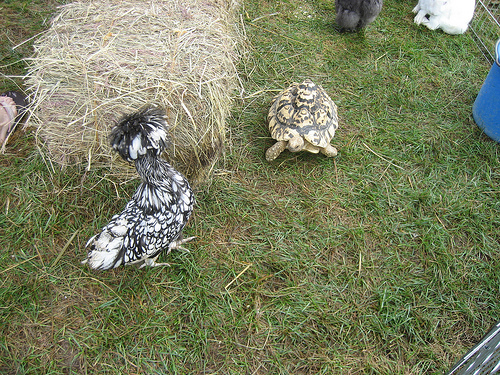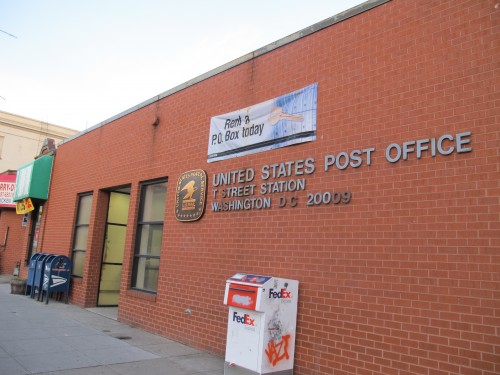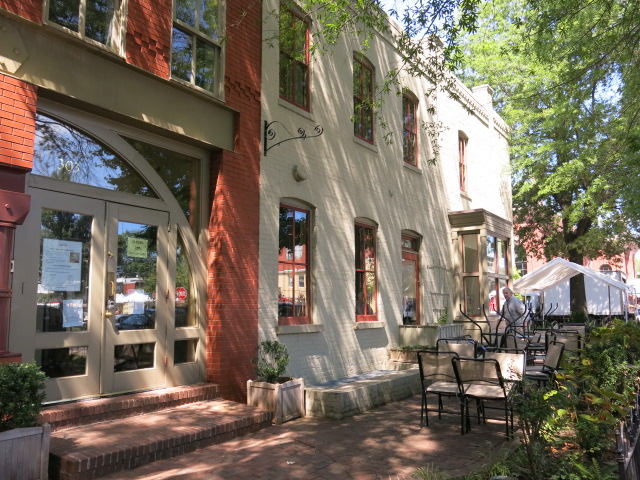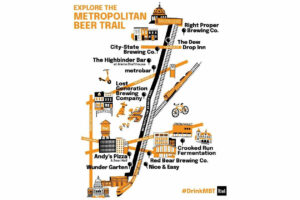
John Reinhardt is an urban planner, writer, photographer, and urban gardener. An avid cook, John is interested in the intersection of urban design, sustainability, and food systems planning. He currently resides in Washington DC and works for the American Planning Association. He currently writes Grown in the City, a blog about urban gardening and food systems planning.
UPDATE: Mea culpa – It is actually solely Department of Health codes that prevent the keeping of chickens and bees in DC proper. While urban food systems is a topic of discussion with the zoning code update, it is not any action by the Department of Planning that explicitly prevents chickens and bees.
One of the hot topics in urban agriculture and urban planning these days is chickens (or goats or any other type of animal typically associated more with the country farm than the urban homestead). One of the most common questions is “can I keep them?” The short answer is – probably not, at least legally. DC has confusing, even downright ambiguous, laws regarding bee keeping. Laws about other animals are more explicit. For example, “Section 902 of the Animal Control Code requires hens to be 50 ft. from any residence.” Rules are a bit more lax in some counties in the metropolitan region.
But why is keeping animals in the city such a problem? One word: zoning.
Continues after the jump.
For a little urban planning 101, zoning laws were first created in New York City in 1916 with the intention to protect health, safety and welfare. Think about New York, Chicago, or Pittsburgh in the early 1900s: Unchecked capitalism, physically manifested as tenement houses, soot covered buildings and polluted water. Zoning was viewed as the solution to urban ills. In 1926, zoning was upheld as constitutional by the Supreme Court in the Village of Euclid, Ohio, v. the Ambler Realty Company. Separation of land uses became the norm and “incompatible uses” such as chicken farms and stockyards, were banished from many cities. (The advent of zoning also largely influenced and encouraged the pattern of the resource-consumptive suburban sprawl…but that’s a different – and much longer – post). Flash forward nearly a century, and many cities have only recently started updating their zoning to reflect today’s sensibilities about mixed-use, density, and urban agriculture. DC is in the process of a zoning code rewrite as we speak (it hasn’t been updated since 1958) and urban agriculture and food access is being considered as part of the update.
So how can you voice your opinion if you’d like to keep chickens or bees? The zoning code rewrite, which kicked off in 2007 with a series of public meetings, is coming to a close, but it may not be too late to contact the Planning Department to let them know your opinions. Until the codes change in the district, however, those “local” eggs and honey are illicit items!
Recent Stories

For many remote workers, a messy home is distracting.
You’re getting pulled into meetings, and your unread emails keep ticking up. But you can’t focus because pet hair tumbleweeds keep floating across the floor, your desk has a fine layer of dust and you keep your video off in meetings so no one sees the chaos behind you.
It’s no secret a dirty home is distracting and even adds stress to your life. And who has the energy to clean after work? That’s why it’s smart to enlist the help of professionals, like Well-Paid Maids.

Unlock Peace of Mind for Your Family! Join our FREE Estate Planning Webinar for Parents.
🗓️ Date: April 25, 2024
🕗 Time: 8:00 p.m.
Metropolitan Beer Trail Passport
The Metropolitan Beer Trail free passport links 11 of Washington, DC’s most popular local craft breweries and bars. Starting on April 27 – December 31, 2024, Metropolitan Beer Trail passport holders will earn 100 points when checking in at the
DC Day of Archaeology Festival
The annual DC Day of Archaeology Festival gathers archaeologists from Washington, DC, Maryland, and Virginia together to talk about our local history and heritage. Talk to archaeologists in person and learn more about archaeological science and the past of our







